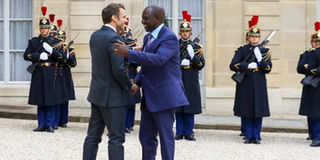Let state seek better terms with partners

President William Ruto and France President Emmanuel Macron at Elysee Palace in Paris on January 24.
President William Ruto recently ended his tour of France, which the presidency described as meant to enhance cooperation with Kenya in development projects and promoting peace and security in East Africa.
The President also visited Senegal, where, as keynote speaker at an agriculture summit, challenged Africa to move from agriculture to value addition and manufacturing. Many more development-oriented visits are expected.
While the move by the President to engage external development partners is laudable, there is a need to ensure Kenya gets the very best from such agreements, which are normally negotiated and agreed upon by technical experts before the responsible government representatives put ink on paper. Kenya, and by extension Africa, has often found itself getting the short end of the stick, especially when dealing with Western countries and other economic giants, such as China.
President Ruto must ensure Kenyans are not disadvantaged by poorly negotiated deals that burden the taxpayers and condemn them to a vicious cycle of poverty. African countries are particularly disadvantaged when engaging with the richer nations, partly due to information asymmetry, which gives the latter an upper hand at the negotiation table.
While the developed countries, mostly Africa’s former colonial masters, have dropped the “donor” tag and talk of “development cooperation” in reference to relations with the continent, the relationship is unequal. African leaders engage their counterparts from wealthier nations as lesser partners.
During President Mwai Kibaki’s reign, there was a significant shift towards preference for China as a development partner, a departure from President Daniel arap Moi’s tenure, which was still looking West for financial assistance. China was willing to lend without the conditionalities often attached to loans from the Bretton Woods institutes—the International Monetary Fund (IMF) and the World Bank. Hence, Western powers accuse Beijing of colonising Africa with a huge debt burden as China raises its geopolitical strategic importance in the continent through its ambitious Belt and Road Initiative and close ties with the African Union.
Regardless of President Ruto’s choice of development partners, there is a need for Kenya to utilise top technical experts when engaging in negotiations with external partners to ensure we get the best deal possible and limit the disadvantages. Kenya must rid itself of cartels and individuals keen on cutting deals during loan negotiations for personal gain, and have a robust team of technical experts to help it in negotiating for better terms.
While external development partners will talk of “cooperation”, they are keen on making huge profits and Africa is always the underdog. In Kenya, where negotiations are mostly more political than economic or strategic, the losing party is likely to be Kenyans. Our top bureaucrats must give an honest opinion and be bold enough to advise the presidency, even when their views are unpopular.
Dr Kirui, PhD, teaches history and governance at University of Eldoret. [email protected].





